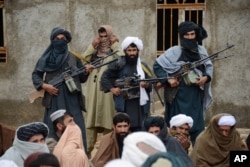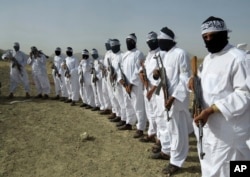They both call themselves the Taliban. They regularly carry out deadly suicide bombings, kill civilians with impunity and, in many respects, behave like brutish terrorist groups.
So why is one — the Tehrik-I Taliban of Pakistan — on the State Department's list of Foreign Terrorist Organizations, while the other — Afghanistan's Taliban — is not?
To the U.S., the Afghan Taliban is largely an insurgency with control over vast swaths of territory and aspirations to govern the country, while its Pakistani offspring is considered nothing but a terrorist organization. But the real reason the Afghan Taliban is not on the list has more to do with political considerations than whether or not it meets the statutory criteria for a terrorist designation, experts say.
To be declared a foreign terrorist organization by the State Department, a foreign group must engage in terrorism and threaten the security of U.S. nationals or the national security of the United States. The Afghan Taliban meet both criteria.
Yet, political expedience has obligated keeping the group off the list of 61 organizations ranging from the Afghanistan branch of the Islamic State group to the Palestinian group Hamas, experts say.
In the case of the Taliban, the deterring factor has long been a concern that applying the terror label to the group would restrict U.S. and Afghan government diplomatic contacts with the Taliban, making peace talks more difficult.
"There is no doubt that the Taliban occasionally attacks civilians intentionally, not accidentally, and that's the definition of terrorism," said James Dobbins, a former U.S. Special Representative for Afghanistan and Pakistan. "And, thus, the designation would be accurate enough. The question is whether or not it would serve the U.S. and Afghan government purposes for that step to be taken."
‘Call the enemy by its name’
With the Trump administration scaling up its war on Islamic terrorist groups with a vow to "call the enemy by its name," the question has entered into discussions over a new Afghan war strategy.
Gen. John Nicholson, the top U.S. commander in Afghanistan, told VOA's Afghan service earlier this month that the question of whether the Taliban should be designated as a terrorist organization "is an important one for the [new] administration to consider and it will be part of our conversation with them as the weeks unfold."
Nicholson did not say whether he favored a terrorist designation, but he left little doubt how he viewed the Taliban, calling the group "an enabler of terrorists" with links to many terrorist organizations, including al-Qaida and the Haqqani network.
Nicholson told the U.S. Senate's Armed Services Committee earlier that 20 of the 98 U.S.-designated terrorist groups in the world operate in Afghanistan and Pakistan and that the U.S. was seeking to set up an "enduring counterterrorism platform" in Afghanistan.
Asked whether the administration is considering designating the Taliban as a terror group, a State Department spokesperson referred to a 2002 executive order labeling the Taliban a "Specially Designated Global Terrorist Entity" and a 2008 Congressional law mandating that the Taliban be considered a terrorist organization for immigration purposes.
While the Global Terrorist Entity sanctions are focused on financial transactions, a foreign terrorist organization designation prohibits "material support," such as training, and carries greater weight, according to Oliver Krischik, a trade law attorney specializing in U.S. economic sanctions.
"Just the act of designating an organization on the Foreign Terrorist Organization list itself is a powerful move just in name, and that is something which can have a severe impact on the way other people around the world will or will not engage in business with you," Krischik said.
Long eager to reach a political settlement with the Taliban, successive Afghan governments have stopped short of calling for the group to be designated as a terrorist organization, said Dobbins, who led the 2001 Bonn negotiations that created the first post-Taliban government in Afghanistan.
"If the U.S. was seriously proposing to do it, my guess is it would lead some Afghan officials to counsel against it precisely because they'd still hope eventually to be able to launch some process of reconciliation," Dobbins said. "If [the Trump administration] really wants to create an obstacle to communications with the Taliban, then this probably could have that effect."
A spokesman for Afghan President Ashraf Ghani said he was unaware of any proposal to designate the Taliban as a terrorist organization.
Advantages of the label
With the U.S. military enjoying broad authority to target the Taliban, a terrorist designation would have little impact on the battlefield. But declaring the Taliban a terror group could have one advantage, according to Michael Ryan, a senior fellow at the Jamestown Foundation in Washington: It would make it politically easier for the Trump administration to pressure foreign governments backing the Taliban. The U.S. has long accused Pakistan of sheltering the Taliban, a charge denied by Islamabad.
In labeling the Taliban a terror group, the administration could also argue that "we're just tidying up the list," Ryan said, noting that the Taliban-allied Haqqani network and IS branch of Afghanistan and Pakistan are on the list. "Or they could say, as some Republicans said in the last administration, President [Barack] Obama was too weak on this issue and they're going to strengthen it up."
Gianni Koskinas, a former military officer now with the New America think tank in Washington, argued that merely excluding the Taliban from the terror list is unlikely to encourage the group to enter into peace talks.
"Ultimately, if the Afghan government chooses to reconcile with the Taliban, that is irrelevant as far as I'm concerned to the designation of terrorist or not," Koskinas said. "The notion that you can tie and bind reconciliation with something that is a very black-and-white fact that they're a terrorist organization, that they're behaving as one, is illogical to me."
Designating the Taliban as a terrorist organization would bring clarity to the U.S. position in Afghanistan, Koskinas said. "The message should be clear: If you behave like this, then you're a terrorist organization. Period," he said.
VOA State Department correspondent Nike Ching and VOA's Afghanistan Service contributed to this report.







